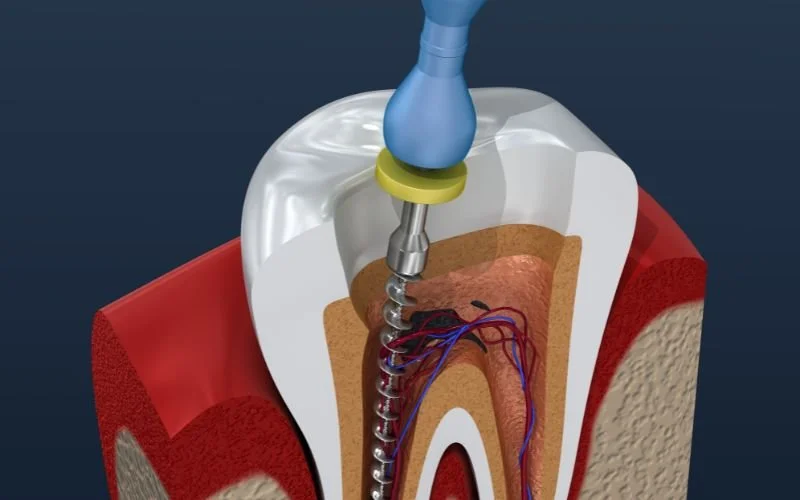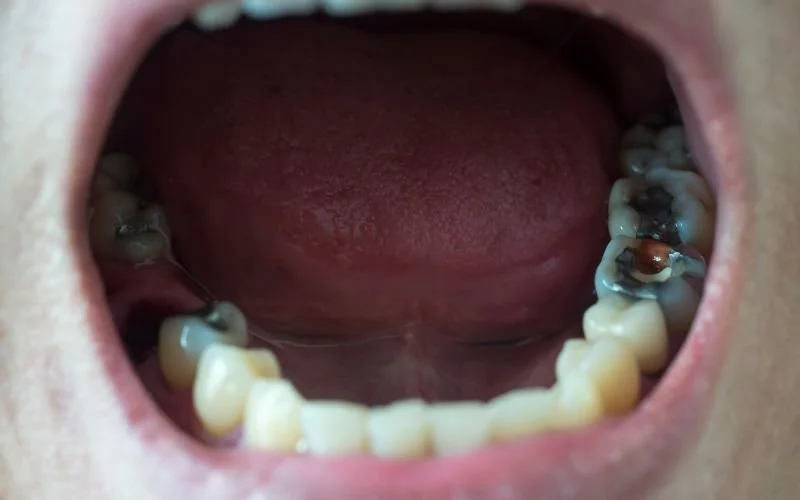Dental Nerve Treatment: Everything you need to know from the hand of specialists
ProDent is a dental clinic specialized in offering high quality treatments to its patients.
Among the various procedures performed in our clinic, dental nerve treatment is one of the most common.
In this article, we will explain everything you need to know about this dental procedure.
¿What is dental nerve treatment?
Dental nerve treatment, also known as endodontics, is a procedure performed to remove the infected or inflamed dental pulp inside the tooth.
The dental pulp is that soft tissue in the center of the tooth that contains the nerves and blood vessels.
When dental pulp becomes infected or inflamed, it can cause severe pain, tooth sensitivity, swollen gums and other unpleasant symptoms.
Treatment of the dental nerve is the only way to eliminate the pain and inflammation and save the tooth.
Symptoms of an infected dental nerve that you should not ignore
When the dental nerve becomes infected, a number of symptoms may appear, which may vary depending on the severity of the infection and the area affected. Some of the most common symptoms of infected dental nerve include:
Pain: Dental pain is the most common symptom of an infected dental nerve. The pain may be constant or intermittent and can range from mild to severe. Pain may worsen when you chew or apply pressure to the affected tooth
Tooth sensitivity: Tooth sensitivity is another common symptom of an infected tooth nerve. You may feel pain or sensitivity when you consume hot or cold foods or drinks, or when you breathe cold air. Tooth sensitivity can be mild or intense and can last for a few seconds or a few minutes
Inflammation of the gums: If the dental nerve becomes infected, it can cause inflammation in the gums surrounding the affected tooth. The gums may become red, swollen and bleed when you brush or floss
Tooth discoloration: An infected tooth nerve can cause discoloration of the affected tooth. The tooth may turn yellow, gray or even black. If you notice that one of your teeth has changed color, you should see a dentist as soon as possible
Dental fistula: In severe cases of dental nerve infection, a dental fistula may form, which is a pus-filled lump that forms in the gums near the affected tooth. The fistula may burst and drain pus, which may temporarily relieve pain
If you experience one or more of these symptoms, it is important to see a dentist as soon as possible to receive an accurate diagnosis and determine if you need dental nerve treatment.
Early treatment of an infected dental nerve can prevent serious complications and save the tooth.
Factors that cause infection of the dental nerve
There are several factors that can cause infection or inflammation of the dental nerve, among them are:
Dental caries: When bacteria from dental plaque accumulate on the tooth, they can erode the enamel and dentin and reach the dental pulp
Dental trauma: A strong blow to the tooth can damage the dental pulp and cause inflammation or infection
Dental cracks or fissures: Cracks or fissures in the tooth can allow bacteria to enter the dental pulp and cause further infection
Previous dental treatments: Dental treatments such as fillings or crowns can weaken the tooth and make it more vulnerable to infection of the dental nerve
How is a dental nerve treatment performed?
Treatment of the dental nerve is performed in several stages and requires several visits to the dentist.
🔎Evaluation: At the first visit, the dentist evaluates the affected tooth and performs an x-ray to determine the degree of damage to the dental nerve
💉 Anesthesia: Before starting the procedure, the dentist administers a local anesthetic to numb the tooth and the surrounding area
🦷Access to the dental pulp: The dentist makes an opening in the crown of the tooth to access the dental pulp
✂️Eliminación of the dental pulp: The dentist uses special instruments to remove infected or inflamed dental pulp and clean the root canal (the canal that connects the dental pulp to the root of the tooth).
👨⚕️Relleno root canal: After cleaning the root canal, the dentist fills it with a special material called gutta-percha to seal it and prevent future infection
✅Tooth restoration: Finally, the dentist places a temporary filling in the tooth opening and schedules an appointment to place a permanent filling or crown
When is it necessary to perform this treatment at ProDent?
Treatment of the dental nerve is necessary when the dental pulp becomes inflamed or infected and cannot heal on its own. If left untreated, the infection can spread to other areas of the body and lead to serious complications.
Symptoms that indicate the need for dental nerve treatment include severe pain when biting or chewing, tooth sensitivity to temperature changes, swelling of the gums, discoloration of the tooth, and the presence of a fistula (a pus-filled lump) in the gums.
If you experience any of these symptoms, it is important to see a dentist as soon as possible to evaluate the condition of your tooth and determine if you need dental nerve treatment.
Recommendations to follow after dental nerve treatment
After dental nerve treatment, it is normal to feel some pain or sensitivity in the tooth for a few days. To reduce discomfort, you can take over-the-counter pain relievers such as ibuprofen or acetaminophen, and apply ice to the affected area for 10-20 minutes several times a day.
In addition, it is important to follow these recommendations after dental nerve treatment:
❌Avoid chewing with the treated tooth for at least 24 hours
❌Do not consume hot or cold foods or beverages for the first 24 hours
✅Brush and floss as usual, but do so carefully so as not to damage the treated tooth
❌Avoid eating sticky or hard foods that may damage the temporary filling or permanent crown
✅Visit the dentist as directed to place the permanent filling or crown.
Dental nerve treatment is a common and safe procedure used to remove infected or inflamed dental pulp and save the tooth.
If you are experiencing severe pain, tooth sensitivity or gum inflammation, it is important to see a dentist as soon as possible to evaluate the condition of your tooth and determine if you need dental nerve treatment.
At ProDent, we have a team of highly trained specialists and the most advanced tools to perform dental nerve treatments effectively and safely.
If you need dental nerve treatment or have any other dental concerns, don't hesitate to contact us. We are here to help you maintain a healthy and radiant smile.



